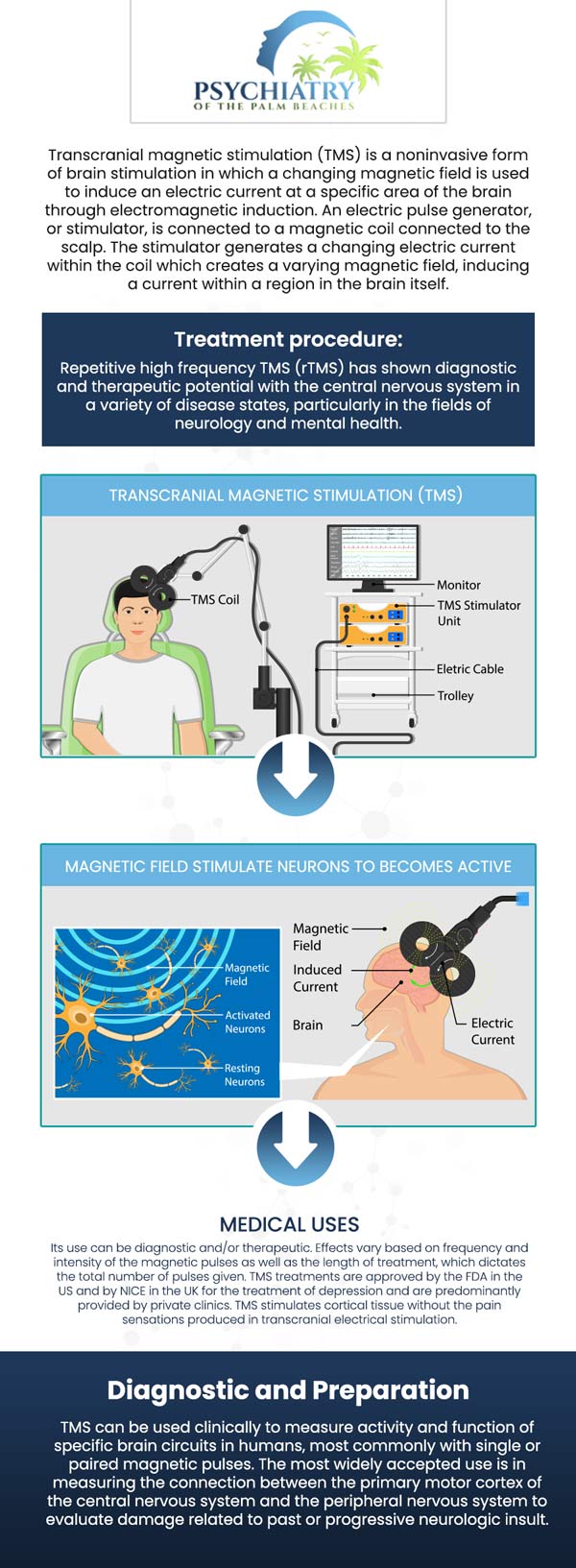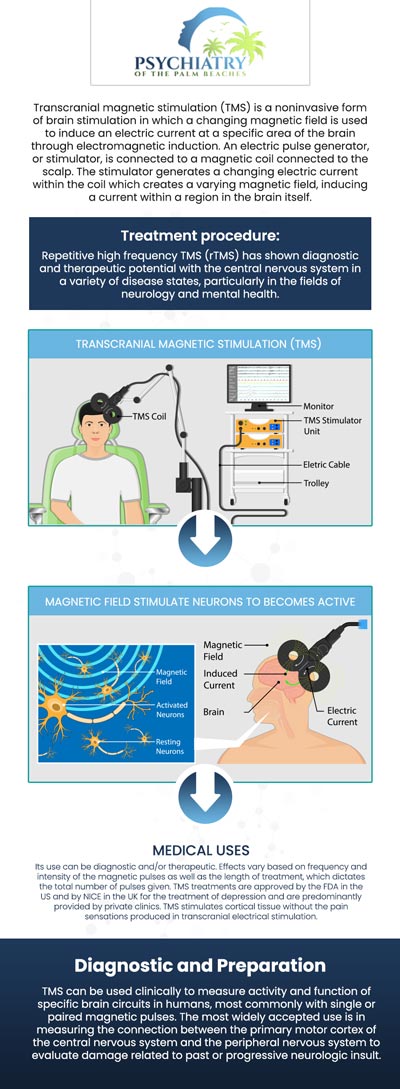Is Brainsway TMS Therapy Right for You?
Our team offers Brainsway TMS Therapy, a non-invasive option for patients living with depression or other mental health conditions that haven’t fully responded to standard treatments. Rather than relying on medication, this approach uses magnetic pulses to stimulate deep regions of the brain linked to mood regulation. Unlike older forms of TMS, Brainsway’s unique coil design allows it to reach broader and deeper targets, potentially improving outcomes for those who’ve tried other methods without lasting relief. For more information, contact us or book an appointment online. Visit Psychiatry of the Palm Beaches serving Jacksonville, Boynton Beach, Palm Beach Gardens, Stuart, Royal Palm Beach, Port St. Lucie, Melbourne, Fort Lauderdale, and Jupiter, FL.


Table of Contents:
Who qualifies for Brainsway TMS Therapy treatment?
How many sessions of Brainsway TMS Therapy are needed for effective treatment?
How do I know if Brainsway TMS Therapy is right for me?
What should I expect during a Brainsway TMS Therapy session?
Most individuals considered for Brainsway TMS have already attempted one or more antidepressant medications without experiencing meaningful or sustained improvement. That treatment resistance is often what brings the patient into consideration for TMS in the first place. However, eligibility is also tied to diagnosis, medical history, and whether any conditions might interfere with the magnetic pulses used in treatment. For instance, individuals with a history of seizures may not be suitable candidates.
Beyond that, providers also look at the broader picture, including how long symptoms have persisted, what other treatments have been attempted, and how those symptoms are affecting daily life. Brainsway TMS is typically reserved for cases where symptoms are moderate to severe and impairing function, but not always. For some, it’s a chance to step back from a long medication trial-and-error cycle. The process often begins with an in-depth evaluation, giving providers a fuller sense of what’s been tried and how the patient has responded up until this point.
The team at Psychiatry of the Palm Beaches uses these evaluations to confirm that treatment can be administered safely and sustainably. That may involve conversations around other mental health conditions, prior hospitalizations, or current therapies. When a patient is a good fit, the treatment often complements ongoing therapy or medication, depending on what’s needed to support long-term stability.
Brainsway TMS Therapy is typically delivered over several weeks, often with daily sessions scheduled across that span. While every plan is personalized, a standard course may involve five sessions per week for roughly four to six weeks, followed by a tapering period if needed. Each session usually lasts around twenty minutes, and the frequency is part of what makes the treatment effective in building a steady rhythm of neural stimulation that compounds over time.
The number of sessions is designed to give the brain time to adapt to the stimulation and start forming new patterns. Some individuals begin to notice shifts in mood or thought clarity within the first couple of weeks, while others may not feel a major change until later in the treatment. What matters most is consistency. Missing multiple sessions or interrupting the schedule can impact how well the treatment works, which is why the structure is closely monitored by the clinical team.
Mental health psychiatrists at Psychiatry of the Palm Beaches develop these timelines based on the individual’s goals, diagnosis, and progress. For patients who show a positive response early on, the treatment course may eventually shift into a maintenance phase. For others, if results aren’t clear-cut, further adjustments can be made. Either way, the goal is to support progress that compounds and improves daily functioning.
Determining whether Brainsway TMS Therapy is the right fit usually starts with a look at how the individual has responded to past treatments. If medications have caused significant side effects or produced only limited results, TMS can offer a different route that works by targeting the brain more directly rather than relying on how the body metabolizes pharmaceuticals.
A thorough consultation helps clarify whether the symptoms being treated line up with the kind of neural activity Brainsway TMS is designed to address. That involves understanding the timing, intensity, and impact of symptoms, as well as screening for physical health conditions that might interfere with treatment. In some cases, a patient might meet the medical criteria but still decide to hold off based on life circumstances, work schedules, or financial considerations. These are all weighed carefully as part of the decision-making process.
At Psychiatry of the Palm Beaches, this process is guided by both clinical experience and patient goals. When Brainsway TMS is recommended, it’s because the evidence suggests it has the potential to move the needle where other approaches haven’t. The final decision is always collaborative. The individual is walked through what to expect, what the day-to-day commitment looks like, and what signs might indicate early progress, so there’s clarity before anything begins.
A typical Brainsway TMS session starts with the patient seated in a comfortable chair, fully awake and alert. The provider positions the helmet-like device over the head, targeting specific brain areas known to be involved in mood and cognitive regulation. Once activated, the device sends magnetic pulses through the skull to stimulate brain tissue. The sensation is generally well-tolerated. The session itself tends to be short, lasting around 20 minutes. Patients remain in the chair for the duration, with no need for anesthesia or sedation. Most can resume regular activities shortly after finishing, though some may choose to rest or take it easy depending on how they feel. While side effects are uncommon, mild scalp discomfort or lightheadedness can occasionally occur, especially early in the treatment cycle. These typically fade as the body adjusts.
The specialists at Psychiatry of the Palm Beaches closely monitor each session to ensure correct positioning and track any changes in symptoms or side effects. Adjustments can be made mid-course if needed, based on how the individual is responding. Over time, the session can become a part of a familiar routine.
Find Out if BrainsWay TMS Is Your Breakthrough Option with Our Team
If you’ve been searching for a treatment that goes beyond medication, BrainsWay TMS may be the breakthrough you need. Our team provides personalized evaluations to determine whether Deep TMS can effectively target the root causes of your depression or OCD. With its deeper brain stimulation capabilities, this therapy offers renewed hope for those who haven’t responded well to traditional care. Our team ensures each patient experiences a supportive, comfortable process from the first consultation onward.
At Psychiatry of the Palm Beaches, our expert team is here to help you explore whether Brainsway TMS Therapy is the right treatment for your needs. We are committed to offering effective, non-invasive solutions for lasting relief from depression and other mental health conditions. For more information, contact us or book an appointment online. We serve patients from Boynton Beach FL, Delray Beach FL, Palm Beach Gardens FL, Jupiter FL, Stuart FL, Palm City FL, Royal Palm Beach FL, Wellington FL, Citrus Ridge FL, Jacksonville FL, Riverside FL, Port St. Lucie FL, Beau Rivage West FL, Melbourne FL, Palm Bay FL, Fort Lauderdale FL, Hollywood FL, Jupiter FL, North Palm Beach FL, and surrounding areas.
Check Out Our 5 Star Reviews



Additional Services You May Need
▸ Mental Wellness
▸ Relationship Coaching
▸ Depression and Mood Disorders
▸ Women’s Health
▸ Panic Disorder
▸ Medications Management
▸ Men’s Health
▸ Individual Psychotherapy
▸ Bipolar
▸ ADHD
▸ Geriatric Mental Health
▸ Couple’s Counseling
▸ Obsessive Compulsive Disorder
▸ Social Phobia Treatment
▸ Eating Disorders
▸ Post Traumatic Stress Disorder
▸ Psychotic Disorders


